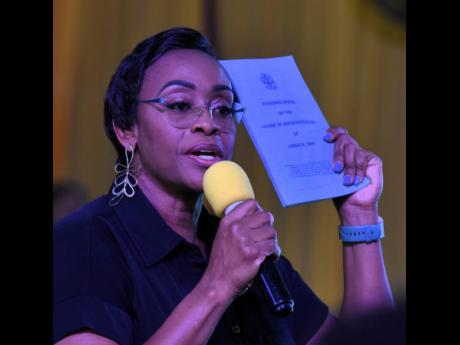New mic system expected to keep ‘unruly’ legislators in check
Describing some of her colleague legislators as “unruly” Juliet Holness, the deputy speaker of the House of Representatives, says Parliament’s $18-million microphone system upgrade reflects the rules of the Standing Orders.
The Parliamentary Opposition has decried how the new public address (PA) system functions, with the House Speaker having the sole power in determining whose microphone is open to address the Lower House of Parliament.
Holness said members of parliament were invited to a training session for the new system two hours before Parliament resumed from its summer break but noted that very few attended.
“The new mic system operates in keeping exactly with the Standing Orders. However, when persons over time started drifting their behaviour and pattern from what is supposed to happen, if you’re not careful, you start to think like many of our constituents that that is exactly what is supposed to be,” said Holness.
She was speaking during a town hall meeting with members of the joint select committee considering job descriptions, codes of conduct and performance standards for parliamentarians following a Green Paper tabled by Prime Minister Andrew Holness in Parliament in June, when she addressed the issue.
“The Standing Orders specifically say that you are not to speak unless the Speaker acknowledges you and tells you, you can speak. No mic system changes that. That is the rule,” she asserted.
The St Andrew East Rural member of parliament (MP) said the current practice by MPs is to crosstalk, speak at will and while someone else has the floor.
She noted that the rule is that the person on the floor should speak uninterrupted.
Holness said, “very often”, Hansard, the transcripts of parliamentary debates, come up short because writers are not able to hear or follow the debate.
“They don’t know exactly what was said sometimes and when called on to say, ‘X or Y happened in Parliament, pull up the records’ they are nervous and say, ‘Lord, I missed that’. [This is] because some persons are unruly,” Holness told the hybrid public gathering at Wolmer’s Boys’ School in Kingston.
“…The mic system has not made any change to your behaviour. This (Standing Orders) is the book that guides the structure, the principle, the operations of the House of Parliament,” she stressed.
NO CONSULTATION
Natalie Neita Garvey, deputy leader of opposition business in the House of Representatives, has contended that there was no consultation in installing the new system.
The Opposition has described the system as a “gag-o-phone” with the sole purpose of preventing its members from speaking on critical matters. It noted that, if a member has not been acknowledged by the chair and persists in speaking, their comments will not be captured by the Hansard writers, who must record every word said in the Chamber.
But the parliamentary administration has said the old system had been malfunctioning.
The Government has also insisted that it had no role to play in the upgrade.
The 30-year-old system was replaced by a Televic D-Cerno conference system, which consists of two ‘chairperson’ consoles – one at the presiding officer’s desk for meetings of the Senate and House; and the other at the chairperson’s desk for use in committee meetings. The other consoles are ‘single delegate’ units, which allow the presiding officer/committee chairperson sole control to open the microphone of a member who has pressed the button to signal his/her intention to speak.
The new system automatically selects the member to speak based on the order in which persons signal their intention; that is, the first person to indicate that he/she wishes to speak will be the first person allowed.
The old system had only one ‘chairperson’ console, which was located at the presiding officer’s desk and gave the presiding officer the ability to mute other microphones.

